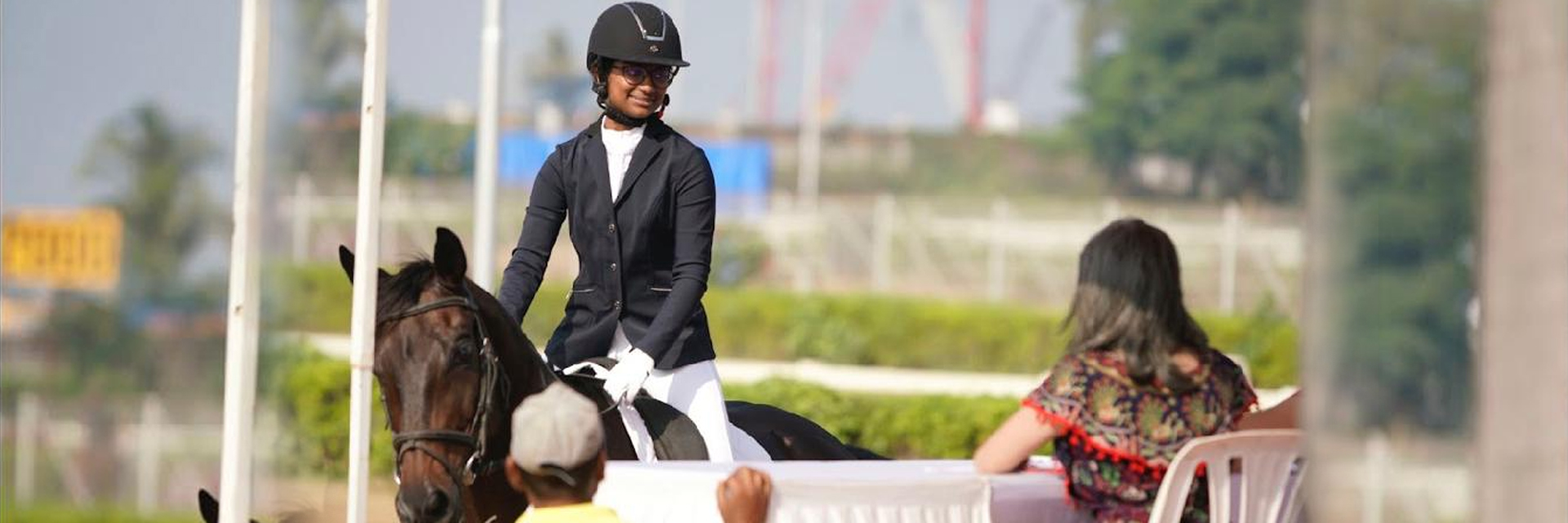(November 14, 2023) Divyakriti Singh has not been back home in the last two years. She missed all the festivals and other important events, which she would have otherwise celebrated with her family at their home in Jaipur, Rajasthan. It’s sacrifices like this and many more, that helped her gallop towards a historic victory which equestrians across the world will forever remember. She was among the four-member contingent that won India the historic gold at the Asian Games 2023, held at Hangzhou, China recently.
“We definitely dreamt of a podium finish but to win the gold medal is surreal, it’s extraordinary and it should be like that,” smiles Divyakriti, in an exclusive with Global Indian. The historic win was the end result of hard training for years, perseverance, sacrifices and above all, the indomitable will to shine for India. “All the sacrifices we made are a small price to pay for the things we get to do,” says the 23-year-old, who is on cloud nine post the team’s win. She scored 68.176 in Asian Games.
View this post on Instagram
The victory marked the first time in 41 years that India has achieved the feat. “The best three scores were counted from our team and I’m very happy that I was able to contribute to that,” says Divyakriti who was honoured with Maharaja Sawai Padmanabh Award for Young Achiever in the field of Sport at The Sawai Jaipur Awards 2023.
In Europe
For the last three years, Divyakriti has been living in Europe, preparing for the Asian Games. “I’ve been based in Denmark and then in Germany. I have been very involved with the daily routine of my horses. I’m in the stable every day, all days of the week,” informs the equestrienne, who visited Netherlands, Belgium, Germany, Austria and Florida, USA as part of her training.
Her routine hardly changed during her training years. Divyakriti’s day would start at 5 am sharp and she would head straight for the stable. Even during the peak Europe winter, she would not compromise on her schedule.
The young rider currently holds the number one spot in Asia and ranks an impressive 14th globally, according to the International Equestrian Federation (FEI) Global Dressage rankings.
The Rathore Family
Born in Jaipur, Rajasthan, Divyakriti was in seventh grade when she started horse riding. By 12, she was completely involved in equestrian sports and went on to receive numerous individual and team medals at various events including the Junior National Equestrian Championships and All India IPSC equestrian competitions. “Horses are my passion and that motivates me to be a better rider. It keeps me focused on the sport and I’m grateful that I get to do something that I love,” says the alumni of Mayo College Girls School in Ajmer.
View this post on Instagram
A student of psychology in Jesus and Mary College, University of Delhi, Divyakriti is the daughter of Vikram Singh Rathore, a retired Army officer and Alka TejSingh. She has an elder sibling, Digvijay Singh. The Rathore family have been into horse riding for decades. “My entire family was present at the stands cheering for me at the Asian Game. It was a very proud moment for all of us,” says Divyakriti, beaming with pride. Even her grandparents from both mothers and fathers side have also been connected to horses.
Adrenaline Rush
She describes her horse, Adrenaline as a superstar. “He is my best friend and made my dreams come true. Together, we were able to deliver a personal best score which helped Team India clinch the gold medal,” says Divyakriti.
Initially, when she arrived in Europe, Divyakriti was training with a different horse but was not comfortable with him. At that stable, Adrenaline was already the super star. An international dressage rider from Denmark Helene Melsen, who bred the horse, asked her to try Adrenaline for the Asian games. “Once I rode him, the connect was instant and that was the beginning of our partnership,” she says.
Adrenaline, who weighs around 700 kg, has a mind of his own, says the equestrienne. “We have a bond based on trust, which we built through the time I spent at the stables,” says the accomplished equestrienne. She makes it a point to take her horse out for walks and feeds and grooms him. “He even gets a treat after rides, no matter the result,” she says.
View this post on Instagram
Adrenaline, like all other horses, senses everything. “So the key is to be confident and give your horse the confidence,” says the India Today Woman Summit Awardee.
Lessons learned
There are ups and downs in every athlete’s journey and Divyakriti is no exception. “If there is one thing that I’ve learned from my career, it is that do not fret over things that you can’t control. Horse riding has taught me that,” smiles the youngster, who has previously represented the country in Europe and national competitions across the country.
She won the IPA Junior National Polo Championship Winner twice, in 2016 and 2017. She won the gold in the Junior National Equestrian Championship at Kolkata in 2018-2019 at Kolkata, India. In the 2019-2020 Junior National Equestrian Championship at Bangalore. she won the silver.
Prior to the Asian Games, she and her team members underwent a tough selection process. “Our federation had chalked out a set of selection criteria which required us to do the selection trials in Europe. Those trials were international competitions where we were competing against the best riders from all over the world,” she says, adding that it gave her good exposure.
View this post on Instagram
So what’s next ? “I have already started training for the upcoming international tournaments,” she adds.
Follow Divyakriti on Instagram




